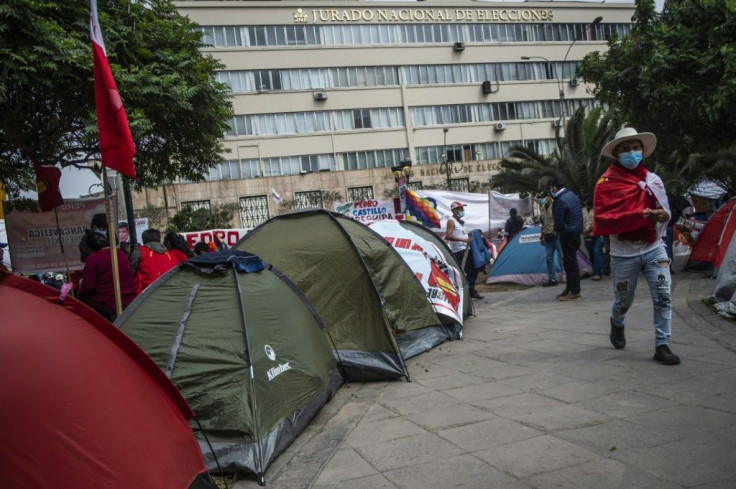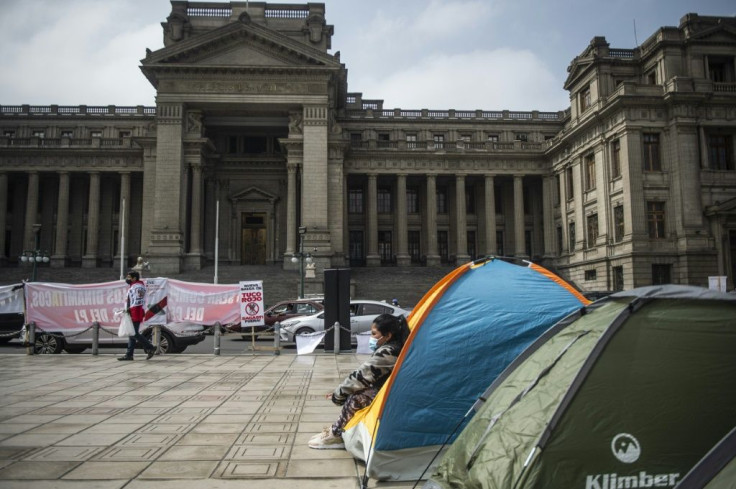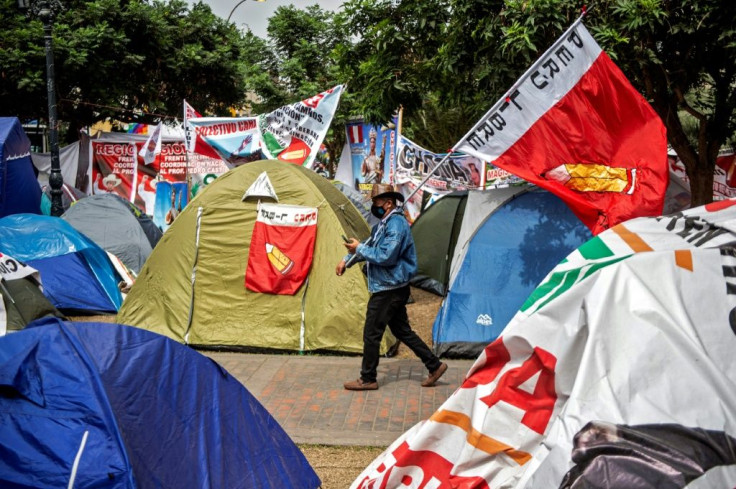As Results Drag, Peruvians Set Up Camp To 'Defend' Vote
A month after presidential elections that have yet to yield a result in Peru, supporters of the neck-and-neck challengers have set up rival tent camps on public squares in the capital to "defend" their votes.
With a ballot review under way amid as-yet unproven claims of fraud, both sides suspect the other's candidate of seeking to usurp power through nefarious means.
Hundreds of supporters of leftist rural school teacher Pedro Castillo, who has already claimed victory, have flocked from the rivers and the mountains of his rural base to Democracy Square.
In the middle of the cold Lima winter, they have set up camp in 180 tents outside the National Jury of Elections (JNE), which is in charge of the vote count review.
The first arrived already three weeks ago. Many are decked out in traditional Andean or Amazonia dress.

"Living in a tent means being cold and not sleeping well but it is worth it for the battle we are fighting," said Martin Quispe, 35, who came from the Andean Cusco region to demand the JNE call the election for Castillo.
According to the count, Castillo received 50.12 percent of the votes cast on June 6 -- some 44,000 more than his rightwing rival Keiko Fujimori.
But Fujimori has claimed fraud and demanded a review of thousands of votes. Accused of corruption, she risks an imminent trial if she loses the race.

Merino Trigoso, 66, is a leader of the Awajun indigenous group in the Amazon, and boasts a crown of feathers and a traditional neck adornment. He, too, is camping for Castillo.
"I intend to stay until we have beaten the corruption," he told AFP.
By his side, 45-year-old Maruja Inquilla insisted: "We will stay until they proclaim Castillo (the winner). If not, we will do something more radical." She is from Coata near the Bolivian border.
Chemical toilets and a medical tent have been erected on the square, and the protesters say they are receiving food from donors.
Some 200 "ronderos" -- members of so-called peasant patrols of which Castillo has also taken part -- guard the improvised camp, brandishing whips to maintain order and, if necessary, repel political adversaries.

Just seven city blocks away, Fujimori fans erected their own camp at the weekend "for democracy and for freedom" outside the Palace of Justice.
Dressed mainly in Peruvian football shirts, many are from the poorer districts of Lima.
"We don't want a communist country, we want a free country so that our children will not suffer from terrorism as in the 1980s" when the government fought the Shining Path Maoist guerillas, said hairdresser Dina Amaya, 55.
Free-market defender Fujimori has sought to paint Castillo, who supports nationalization of mining, oil and gas resources, as a communist threat.
Others have in the past sought to link him to Shining Path, though he says he fought against them as a peasant patrol member.
"We came here to fight for democracy. If they declare Castillo (the winner) all Peruvians will help Keiko to go to the (government) palace," added Amaya, seated on an inflatable mattress in her blue tent.
"These elections are unconstitutional," added Erick Luque, a 30-year-old freelancer.
"We find ourselves in uncertainty. We have realized that democracy is negotiable," he added.
Fujimori visited the camp on Sunday and urged her followers not to give up.
"I call on you to continue in this struggle. This is the moment. We cannot take a step back. We will continue with more firmness," said the daughter of imprisoned ex-president Alberto Fujimori.
Despite the heightened tension for weeks on end, there have been no clashes or disturbances since the polarizing election.
The United States and Organization of American States have said there was no evidence of electoral wrongdoing.
There is no deadline for the JNE to announce a winner at the end of its review, but the new president is scheduled to assume office on July 28, Peru's Independence Day.
© Copyright AFP 2024. All rights reserved.





















